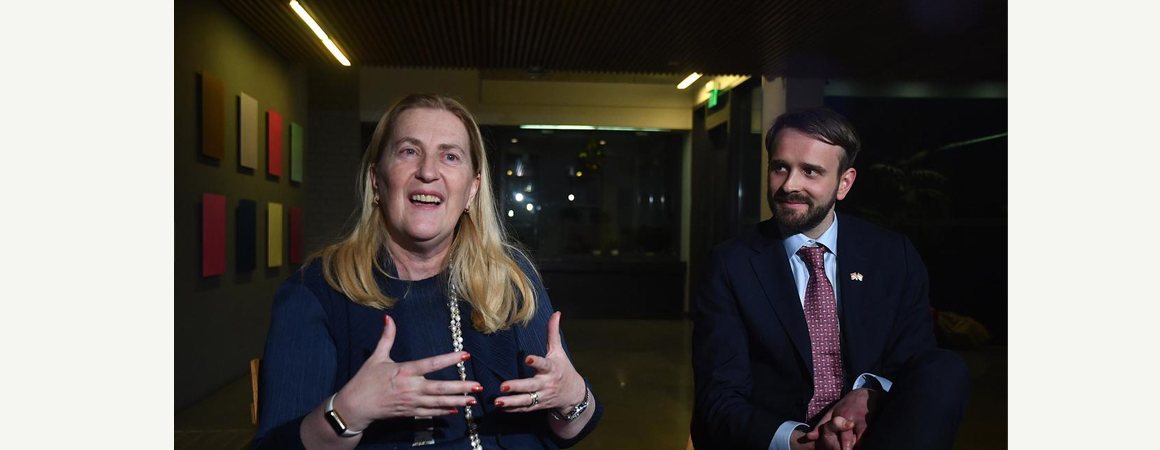Norwegian and Swiss Trade Ministers in Delhi discuss IPRs, goods trade and other issues with Commerce Minister Piyush Goyal
No timeline can be given on the conclusion of talks between India and four Nordic countries of the European Free Trade Association (EFTA) for a Trade and Economic Partnership Agreement (TEPA), said the Trade Ministers of Switzerland and Norway during a visit to Delhi. However, they still hope differences can be resolved in the next few months, before the election process gets under way in India.
Government officials indicated that though the most recent round of talks between trade negotiators from India and the four countries – Iceland, Liechtenstein, Norway, and Switzerland saw the process “gain momentum”, several issues remain. Briefing journalists about the outcome of talks this week, Commerce Ministry officials also said that discussions on “trade in goods and services, trade and sustainable development, SPS [sanitary and phytosanitary] measures, trade remedies and associated trade facilitation, and rules of origin” are still ongoing.
In particular, the Ministers, who met Commerce Minister Piyush Goyal on Wednesday, said that Intellectual Property Rights (IPRs) or patents and copyrights concerns with India were a key “bread and butter” issue for them.
“In EFTA [all four countries] understand each other when it comes to Research & Development [R&D], and so for us, it’s always a key issue. I tell Minister Goyal, it is a bread and butter issue for us to secure the best possible in IPRs,” said Helene Budliger Artieda, Swiss Director of the State Secretariat for Economic Affairs (SECO), speaking to The Hindu in an interview given jointly with Norwegian Trade Minister Jan Christian Vestre in Delhi.
“IPRs are always a challenge for Switzerland and [negotiations with] India are not unique in that. We are known as the most innovative country, and have quickly moved from an agricultural country into industrialisation and Switzerland is one of the leading R&D nations,” Ms. Artieda added, as she said the two sides are closer to an agreement than “ever before, but there are still some remaining topics” to be ironed out.
EFTA-India negotiations for a TEPA, that first began 15 years ago are among several trade partnership agreements that the government’s trade negotiators are working on simultaneously as they try to meet various deadlines ahead of the election process, which is likely to slow down all the talks, including with the U.K., Australia, European Union, Gulf Cooperation Council, and others after February. When asked whether talks with EFTA could take a backseat to the others, especially the U.K. and Australia, which have both already missed several deadlines in the past year, Norwegian Trade Minister Vestre said that it was “up to the Indian side to decide their priorities”.
“What we can say is that the negotiating team on the Indian side are extremely hardworking people and extremely talented and skilled in all aspects, and we really admire how they work on all the different [agreements],” Mr. Vestre added. According to Ms. Artieda, running parallel negotiations with a number of countries is “business as usual”. The EFTA countries, that are not part of the European Union, have already completed 30 FTAs, and are currently negotiating agreements with South American group MERCOSUR, Thailand, Vietnam, and Malaysia.
Ms. Artieda said both sides acknowledge the need to “speed up” the TEPA talks now, and thus had visited India seven times already, while Mr. Vestre was on his third visit to India this week to negotiate the agreement.
“I think we are progressing and that’s also why we keep coming back,” Mr. Vestre said in the interview. “We have some homework to do, and the Indian side said they have some homework to do, but we remain optimistic about this,” he added, when pressed on a timeline for the TEPA agreement.
Speaking at a business chamber event in Kolkata last week, Switzerland’s Ambassador to India Ralf Heckner had said that he remained “positive that the deal would be wrapped up before the [2024] election,” and sources had indicated a new push for the agreement last year could bring EFTA leaders to the Vibrant Gujarat Global Summit (VGGS) to be inaugurated by Prime Minister Narendra Modi early next year. However, the timeline has been pushed back slightly, the sources said, given the introduction of new lines into the list of goods in trade, and the continuing issues over IPRs.
“India-EFTA TEPA negotiations have gained momentum. Both sides have exchanged key interests with regard to trade in goods and services,” the Commerce Ministry spokesperson told The Hindu, when asked about whether the new list would delay the TEPA process further, while diplomatic sources said that it was “one of the open chapters and part or the ongoing negotiations”.
Both the Norwegian and Swiss Trade Ministers stressed the mutual benefits of a trade agreement, especially given India’s large market size and the amount of business the four countries already generate. According to their figures, EFTA nations that rank eighthworldwide in terms of combined merchandise trade, generate more than 2,00,000 jobs in India. In addition, Norway hopes to engage with India about its plans for the mining of critical minerals that China currently has a monopoly on, which could be a key component of India’s plans for 50% of its energy capacity to come from renewables by 2030.
Optimistic on trade agreement ahead of elections: Swiss, Norway Ministers
Norwegian and Swiss Trade Ministers in Delhi discuss IPRs, goods trade and other issues with Commerce Minister Piyush Goyal
No timeline can be given on the conclusion of talks between India and four Nordic countries of the European Free Trade Association (EFTA) for a Trade and Economic Partnership Agreement (TEPA), said the Trade Ministers of Switzerland and Norway during a visit to Delhi. However, they still hope differences can be resolved in the next few months, before the election process gets under way in India.
Government officials indicated that though the most recent round of talks between trade negotiators from India and the four countries – Iceland, Liechtenstein, Norway, and Switzerland saw the process “gain momentum”, several issues remain. Briefing journalists about the outcome of talks this week, Commerce Ministry officials also said that discussions on “trade in goods and services, trade and sustainable development, SPS [sanitary and phytosanitary] measures, trade remedies and associated trade facilitation, and rules of origin” are still ongoing.
In particular, the Ministers, who met Commerce Minister Piyush Goyal on Wednesday, said that Intellectual Property Rights (IPRs) or patents and copyrights concerns with India were a key “bread and butter” issue for them.
“In EFTA [all four countries] understand each other when it comes to Research & Development [R&D], and so for us, it’s always a key issue. I tell Minister Goyal, it is a bread and butter issue for us to secure the best possible in IPRs,” said Helene Budliger Artieda, Swiss Director of the State Secretariat for Economic Affairs (SECO), speaking to The Hindu in an interview given jointly with Norwegian Trade Minister Jan Christian Vestre in Delhi.
“IPRs are always a challenge for Switzerland and [negotiations with] India are not unique in that. We are known as the most innovative country, and have quickly moved from an agricultural country into industrialisation and Switzerland is one of the leading R&D nations,” Ms. Artieda added, as she said the two sides are closer to an agreement than “ever before, but there are still some remaining topics” to be ironed out.
EFTA-India negotiations for a TEPA, that first began 15 years ago are among several trade partnership agreements that the government’s trade negotiators are working on simultaneously as they try to meet various deadlines ahead of the election process, which is likely to slow down all the talks, including with the U.K., Australia, European Union, Gulf Cooperation Council, and others after February. When asked whether talks with EFTA could take a backseat to the others, especially the U.K. and Australia, which have both already missed several deadlines in the past year, Norwegian Trade Minister Vestre said that it was “up to the Indian side to decide their priorities”.
“What we can say is that the negotiating team on the Indian side are extremely hardworking people and extremely talented and skilled in all aspects, and we really admire how they work on all the different [agreements],” Mr. Vestre added. According to Ms. Artieda, running parallel negotiations with a number of countries is “business as usual”. The EFTA countries, that are not part of the European Union, have already completed 30 FTAs, and are currently negotiating agreements with South American group MERCOSUR, Thailand, Vietnam, and Malaysia.
Ms. Artieda said both sides acknowledge the need to “speed up” the TEPA talks now, and thus had visited India seven times already, while Mr. Vestre was on his third visit to India this week to negotiate the agreement.
“I think we are progressing and that’s also why we keep coming back,” Mr. Vestre said in the interview. “We have some homework to do, and the Indian side said they have some homework to do, but we remain optimistic about this,” he added, when pressed on a timeline for the TEPA agreement.
Speaking at a business chamber event in Kolkata last week, Switzerland’s Ambassador to India Ralf Heckner had said that he remained “positive that the deal would be wrapped up before the [2024] election,” and sources had indicated a new push for the agreement last year could bring EFTA leaders to the Vibrant Gujarat Global Summit (VGGS) to be inaugurated by Prime Minister Narendra Modi early next year. However, the timeline has been pushed back slightly, the sources said, given the introduction of new lines into the list of goods in trade, and the continuing issues over IPRs.
“India-EFTA TEPA negotiations have gained momentum. Both sides have exchanged key interests with regard to trade in goods and services,” the Commerce Ministry spokesperson told The Hindu, when asked about whether the new list would delay the TEPA process further, while diplomatic sources said that it was “one of the open chapters and part or the ongoing negotiations”.
Both the Norwegian and Swiss Trade Ministers stressed the mutual benefits of a trade agreement, especially given India’s large market size and the amount of business the four countries already generate. According to their figures, EFTA nations that rank eighthworldwide in terms of combined merchandise trade, generate more than 2,00,000 jobs in India. In addition, Norway hopes to engage with India about its plans for the mining of critical minerals that China currently has a monopoly on, which could be a key component of India’s plans for 50% of its energy capacity to come from renewables by 2030.






NO COMMENT